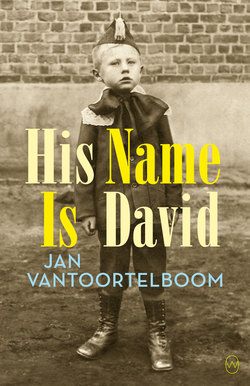Читать книгу His Name is David - Jan Vantoortelboom - Страница 20
На сайте Литреса книга снята с продажи.
Оглавление-
THE SCENT OF waning summer saturating the air never ceased to enchant me. The sweet aroma of plants and trees, in which life was already going dormant as the flow of sap slowed down. Forest animals, who also sensed the threat of the approaching cold, fleeing to safer places or burrowing deeper into the soil. The fading buzz of a wasp looking for forgotten apples, the screeching geese flying in formation overhead, the daddy longlegs awkwardly sticking to the bricks. It charmed me, reminded me of the past. Elverdinge’s Forest Lane especially, with its tall poplars whose foliage was thinning by the day. I took care not to step into the muddy puddles with my only pair of shoes, or get mud on my trousers. The lane belonged to the private estate of an aristocratic family. At this time of the evening, some of the windows of the castle in the distance were already lit. I imagined a library full of bookcases that reached up to the ceiling. And a fireplace with man-sized sandstone pillars on either side. Crackling logs. Perhaps the countess, lounging in an armchair in her nightgown, reading a book while the count, watching her, was lost in a reverie of what else the evening would have in store.
I put my foot in a puddle, cursed. Water seeped into my shoe, soaking my sock. The moon was now in full view: proud and bare, covered in spots, its reflected light floating eerily in the branches of the poplars. At every step, the sodden leather made a wet squelch, and it struck me that robbers in the undergrowth would hear me coming miles away. This is what it must have been like in the old days: hoofbeats on the cobbles, cartwheels creaking over the potholes and bumps. And darkness all around. Then a flash from a barrel. Or a spear in your chest. I hurried to Vlamertinge Street and turned right, until I could see the houses again. Then left, toward the church. I could hear the din coming from the Pumphouse pub from afar. It was Saturday night, and judging by the noise, the pub was packed. I thought I saw someone standing outside—a shadow beside the door, leaning against the brick wall. Probably someone in need of some fresh air, or sobering up. As I slowed my pace, I noticed him politely saying goodbye to some punters leaving the pub. He wasn’t tall, but his bearing commanded respect. He saw me approach, followed me with his eyes. Then I recognized him. It was the same man who, at my arrival a fortnight ago, had sat the elderly man on a chair outside the door. I said hello. He nodded at me. I walked on without looking back.
When I arrived home, Spiney wasn’t foraging in his favourite spot. There was no sign of him underneath the board, either. After frantically searching every corner of my weed garden, I finally decided to wade through the tall thistles, to places I had never set foot on before. I was convinced he had fallen prey to a fox. Or maybe a farmer, alerted by his dog’s continuous barking and whining, had found Spiney rolled up in the grass, ran to fetch a pitchfork and stabbed him to death on the spot. This version of events, which for some reason seemed entirely plausible to me, enraged me so much I punched a hole into the mouldered wood of the loo door with my fist—something I regretted ten seconds later for reasons of decency.
In the living room, I sank down on my chair. I lit a candle I had bought at the grocer’s. A small fly narrowly managed to avoid the flame, then hurtled down onto the tabletop all the same. Leaning over it, I saw one of its wings was singed while the other buzzed in mortal agony. My fingernail put the insect out of its misery.
